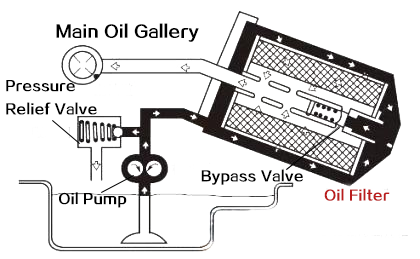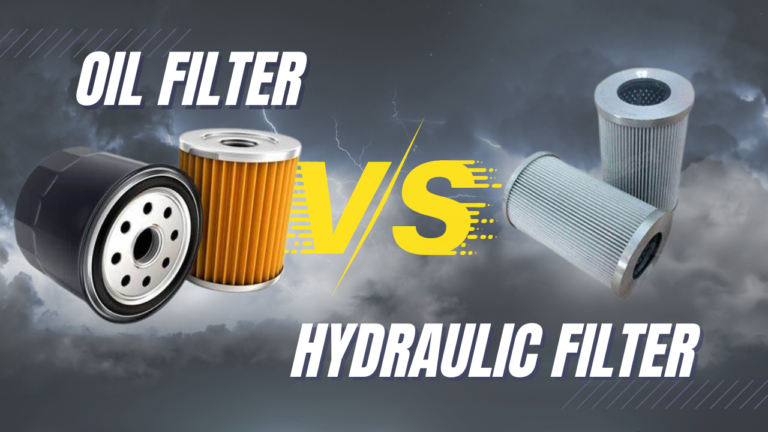Is it true that you should use OEM oil filters?
When faced with a wide variety of oil filters on the market, the first question we need to consider before purchasing is: Should we choose OEM oil filters or aftermarket oil filters? Before discussing this issue, let us first understand the importance of automotive oil filters.
Function of Oil Filter

The working principle of the oil filter
The role of the oil filter is to filter out harmful impurities in the oil from the oil pan and supply clean oil to the crankshaft, connecting rod, camshaft, supercharger, piston ring, etc. It plays a role in lubrication, cooling, and cleaning, making the oil entering the engine cleaner and preventing impurities from entering the engine to damage precision parts, thereby extending the life of these parts.
Therefore, it is very important to replace the oil filter regularly. It is simple and efficient to extend the life of the car and ensure safe driving of the car.
The role of the oil filter element
The working principle of the oil filter :the oil is installed in the oil pan at the bottom of the engine. When the vehicle is started, the oil pump presses the oil into the oil filter element. Under the action of oil pressure, the rubber check valve is pushed open. After being filtered by the filter paper, it is transported to the engine oil channel through the small round holes on the surface of the cylindrical bracket.If the oil filter paper is not replaced for a long time and is seriously blocked, the bypass valve at the bottom of the oil filter element will open to provide the engine with unfiltered oil for lubrication. The lubricated oil flows back to the oil pan. This cycle repeats.
Difference Between OEM Oil Filter and Non-OEM Filter
Non-OEM oil filters are also called aftermarket oil filters. First, let’s take a simple and intuitive look at the table to understand the difference between OEM and non-OEM oil filters.
| Criteria | OEM Parts | Aftermarket Parts |
|---|---|---|
| Compatibility | ✓ | × |
| Availability | × | ✓ |
| Performance | × | ✓ |
| Cost | × | ✓ |
| Warranty | ✓ | × |
Size Difference
Oil filter size is an important factor in determining whether the oil change is effective or not. If the oil size does not match, it will directly affect the effect of filtering the oil.
OEM oil filter size: Car manufacturers are targeting their own vehicle models and can package the oil filter and vehicle to perfectly match, ensuring that it is suitable for your car.
Non-OEM oil filter size: Due to the large number of vehicle models, there may be slight errors in the size of the oil filter in the aftermarket, resulting in the filter purchased by consumers being incompatible with their own cars. However, some auto parts companies will install and test the filter element to detect the filtration efficiency of the oil filter, which greatly reduces the probability of incompatibility.
Quality Difference
Quality is the decisive factor in determining the life of the oil filter element, and it is also a key factor in deciding whether to use OEM or non-OEM.
OEM oil filter quality: It is manufactured in the same way as the original oil filter element of the car, following the quality control standards of the car manufacturer, so the quality is stable.
Non-OEM oil filter quality: The quality of the aftermarket oil filter may vary from manufacturer to manufacturer, so there is a phenomenon of inconsistent quality, and consumers need to select the oil filter.
Performance Difference
People’s use of cars is no longer limited to daily forms, so the choice of performance has also become a very important link.
- OEM oil filter performance: its performance matches the original car performance and cannot achieve more excellent performance for special environments and special requirements of car owners.
- Non-OEM oil filter performance: many auto parts manufacturers will continue to innovate and update oil filter technology according to market and consumer needs, so they can provide performance and additional functions on the basis of OEM oil filters.
Warranty Difference
OEM oil filter warranty: when car manufacturers provide oil filter accessories, they usually come with a warranty to ensure that any defects or problems will be handled by the manufacturer.
Non-OEM oil filter warranty: due to the differences in parts manufacturers, there is no guarantee of warranty service. There is a right to lose the original warranty of the vehicle when using non-OEM oil filters, but there are currently many laws to protect consumers, requiring manufacturers to prove that the use of non-OEM oil filters is the only reason.
Price Difference
Price is often the decisive factor for consumers to choose OEM or non-OEM.
OEM oil filter price: due to the inclusion of brand premium and quality assurance, the price is often higher than non-OEM oil filters.
Non-OEM oil filter price: usually lower price, but it is worth noting that low price is not always reflected in product quality and performance. Since aftermarket companies may continue to innovate oil filters to make them more cost-effective in production, the production cost is reduced and the price is relatively low.
Channel Difference
- OEM filter channel: usually only available through authorized dealers or service centers, it is necessary to carefully identify the authenticity and beware of buying counterfeit products.
- Non-OEM filter channel: can be found in various retail stores and online platforms, which is more convenient.
When to Choose OEM or Non-OEM Oil Filter

OEM or non-OEM oil filter is not a one-time choice. You need to understand the oil filter and your car, and then make a specific choice based on the actual situation. The following are some common situations.
OEM oil filter first
The car is under warranty: The use of OEM oil filters for new cars or vehicles under warranty can ensure the effectiveness of original vehicle repairs.
Car value maintenance: For some new cars and high-end cars, replacing OEM oil filters can meet the manufacturer’s precise specifications for optimal engine performance and maintenance of the vehicle warranty. Ensure the value of the vehicle.
Non-OEM oil filter first
Pursuing higher performance: For consumers who pursue higher performance of their vehicles, they can choose to use a higher-performance oil filter to improve engine performance and enhance fuel economy.
Cost-effectiveness and convenience: In the face of emergencies such as oil filter leakage, you can quickly find a suitable oil filter replacement, which often costs less money and time than original repairs.
Old vehicles: For vehicles that have passed the warranty period, non-OEM oil filters are preferred, as they can be replaced with products comparable to OEM oil filters at a lower price.
How to Choose Non-OEM Oil Filter

Now that we know how to choose an OEM oil filter or a non-OEM oil filter, we will notice that the key to choosing an oil filter is how to choose an oil filter. You need to pay attention to the following points:
Specification matching: Make sure the selected oil filter meets the specifications and recommendations of the car manufacturer, which can usually be found in the vehicle’s user manual or official website.
Filtration efficiency: To compare the filtration effect, refer to the filter particle diameter, pollution holding capacity, pressure flow, and other related data, as well as the original manufacturer data.
Filter standard: Whether it meets and has internationally recognized standards such as SAE and ISO (International Organization for Standardization), and whether it has been professionally tested.
Check the warranty policy: Understand the warranty policy of the non-OEM oil filter. Some high-quality non-OEM filters provide warranty services that are better than OEM filters.
About Caleph
Caleph is committed to producing high-quality automotive parts with decades of manufacturing experience. Our Caleph oil filters can meet the diverse needs of all kinds of buyers, wholesalers and terminal traders.

Caleph oil filter
Perfect compatibility
Caleph oil filters are produced using molds customized to the original parts on a one-to-one basis. This ensures that each product is rigorously tested before leaving the factory to fit a variety of vehicle models. This high degree of compatibility reduces installation issues and ensures a seamless fit between the filter and the vehicle system.
High-efficiency filtration
Caleph oil filters are carefully designed and manufactured from the housing to the filter media. The filter media uses high-quality composite filter paper with uniform and dense pleats, which can effectively capture particulate impurities of 10 microns and above in the oil. This efficient filtration capacity significantly reduces engine wear and extends the service life of the engine.
Quality assurance:
Caleph uses high-quality oil filter housings to provide effective protection for the internal structure. The anti-backflow valve is made of nitrile or silicone, which can normally work even in high-temperature and high-pressure environments, ensuring that the oil will not flow back and keeping the engine lubrication system clean.
Quality assurance:
Caleph oil filters are adapted to various environments, from city roads to various driving conditions in mountainous terrain, ensuring the engine is optimally protected in any situation. Equipped with a high-quality housing, it protects the internal components of the engine. The filter is equipped with an anti-return valve made of nitrile or silicone, which can withstand high temperatures and pressures, preventing oil backflow and keeping the engine lubrication system clean.
Industry standards:
Caleph oil filters strictly follow industry standards such as ISO, SAE, and API to ensure that the performance and safety of the products reach internationally recognized levels. Compliance with these standards not only improves product quality but also enhances consumers’ trust in the brand.
Professional services
Caleph not only provides high-quality products but also provides professional after-sales services. From consultation to after-sales, Caleph provides sellers with a full range of professional services to ensure that consumers can get timely support and solutions during use.
Support customization
Caleph supports customization to meet the needs of different groups of people
Conclusion
In conclusion, choosing an OEM or non-OEM oil filter is a decision that requires you to consider your specific needs, vehicle conditions, and performance requirements. Both options have their pros and cons, and understanding the differences is key to making the right choice for your vehicle.
Engine Oil Filter FAQ
Question 1: How can you tell if a car oil filter needs replacing?
You can observe the color and viscosity of the engine oil, check engine oil pressure, and listen for abnormal engine noises.
Question 2: What is a comprehensive guide to changing the car engine oil filter?
We offer a comprehensive guide detailing the steps and precautions for changing the oil filter.
Question 3: Can a bad oil filter cause a car not to start?
Yes, a clogged or damaged oil filter can prevent the engine from getting sufficient lubrication, leading to the car not starting.
Question 4: What does the engine oil filter housing do?
The engine oil filter housing protects the filter and maintains the flow of oil.
Question 5: Does the car oil filter really filter out impurities like iron pins?
Yes, a high-quality oil filter can filter out various impurities, including iron pins, protecting the engine.







